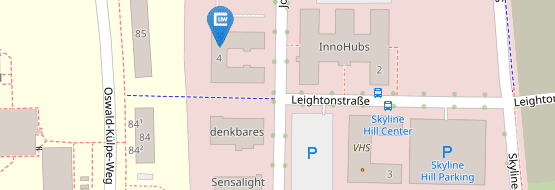Postdoctoral Researcher Position (m/f/d) (100%, TV-L E13, fixed term) in the Clinical Research Unit GB.com
The Professorship for Pattern Recognition (University of Würzburg) and the Department Artificial Intelligence in Biomedical Engineering (AIBE, FAU Erlangen-Nürnberg) invite applications for
a Postdoctoral Researcher Position (m/f/d) (100%, TV-L E13, fixed term)
in the Clinical Research Unit "Immune checkpoints of gut-brain communication in inflammatory and neurodegenerative diseases" (GB.com)
on situ tissue schematics using advanced volumetric imaging and machine learning for image analysis (Project Z02).
The project and your tasks:
The gut-brain axis, a bidirectional communication system controlled by neural, hormonal, metabolic, immunological, and microbial signals, plays a crucial role in modulating brain function. Recent insights highlight the significance of disrupted gut-brain communication in the pathogenesis of gastrointestinal and neurological disorders. Clinical studies indicate a heightened risk of Parkinson’s disease in patients with inflammatory bowel disease (IBD) and suggest a suspected link between IBD and multiple sclerosis (MS). This association underscores the emergence of the concept of a pathological “gut-brain axis”.
Inflammation begins in the tissue, and its shape and extent are largely determined by it (Farber, Nature 2021; Matzinger & Kamala, Nat Rev Immunol 2011). Infiltrated, migratory immune cells are highly plastic and dynamically integrate molecular and biophysical information from their environment that ultimately determines their effector functions and downstream fate. With the advancement of high-dimensional OMICs approaches, we started to appreciate the cellular heterogeneity of complex inflammatory infiltrates. While recent computational approaches can predict cellular interactions based on transcriptomic profiles, their actual functional neighborhoods and imprinting microanatomical environments remain speculative. To understand the relationship between tissue structure, microenvironment architecture, and cell function, multidimensional cell profiling must be complemented by quantitative in situ imaging to incorporate actual spatial biology and tissue organization.
Within the GM.com consortium, we will explore the use of advanced imaging techniques and establish quantitative, machine-learning supported analysis approaches for tissues across the gut-brain axis with high granularity in both 2D and 3D.
This project offers an opportunity to work in a creative, interdisciplinary, and inspiring work environment where you collaborate with renowned partners from research, medicine, and industry to design and implement innovative projects at the intersection of fundamental machine learning and applied research.
Your profile:
- A PhD or equivalent research experience in computer science, medical engineering, or a relevant adjacent field, on machine learning and image analysis, ideally with a focus on biological or medical data.
- Proficiency in Python, with strong coding and debugging skills.
- Experience with deep learning frameworks such as PyTorch, JAX, TensorFlow, or similar libraries.
- Proven research experience in this field, typically via peer-reviewed publications in high-quality journals and ML/CV/Med Imaging conferences.
- Experience working with (medical) image data, ideally microscopic and / or multimodal image analysis.
- Strong proficiency in English, both written and spoken.
- Ability and willingness to work both independently and collaboratively on different research questions.
- Experience working in a highly interdisciplinary team, strong communication skills.
- Experience with microscopic imaging techniques and sample preparation is a plus.
Additional information:
- The project is a collaboration between the University Hospital in Erlangen and the Professorship for Pattern Recognition at the University of Würzburg, an individual arangement of a working place in either Würzburg or Erlangen can be found taking the circumstances of the candidate into account.
- FAU and EBM support career development for postdocs and early career researchers on multiple levels, including startup funding for additional research projects, and mentoring.
- Possibility for part-time remote work (home office).
- The position is available immediately. The position is fixed-term until Dec 2026, a further extension of the position is envisioned.
You can find more information about us and our research here:
Exploring Brain Mechanics:
https://www.crc1540-ebm.research.fau.eu/
AIMI Group and Department Artificial Intelligence in Biomedical Engineering:
https://www.aimi.tf.fau.de/
https://www.aibe.tf.fau.de/
Professorship for Pattern Recognition, located at the Center for AI and Data Science (CAIDAS, Uni Würzburg):
https://www.caidas.uni-wuerzburg.de/pr/ (under construction)
https://www.caidas.uni-wuerzburg.de/
FAU and the University of Würzburg promote equal opportunities. We aim to foster a collaborative and inclusive research environment where interdisciplinary ideas thrive. We welcome researchers from diverse backgrounds and encourage applications from those traditionally underrepresented in AI and healthcare. Female candidates are specifically encouraged to apply. Severely handicapped applicants will be given preferential consideration in the case of broadly equal suitability, ability and professional achievements.
Please send your application including a cover letter with interests, background (max. 1.5 pages), plus full CV and list of prior publications, as one PDF document via e-mail to Prof. Dr.-Ing. Katharina Breininger (katharina.breininger@uni-wuerzburg.de), head of the professorship for pattern recognition at University of Würzburg. Additional attachments can include letters of reference from former supervisors, PhD certificate, or transcripts. Please include [Application: EBM Postdoctoral Position] in the subject line. Applications will be considered as they are received and until the position is filled. Kindly indicate a possible starting date in your application. Please send questions to the position or the tasks to katharina.breininger@uni-wuerzburg.de.
Please note that the candidate evaluation involves one or more scientific-technical presentations and interview appointments to be held in person or via teleconferencing. Applications sent via e-mail will be confirmed within a week. Applications not complying with the above requirements may neither be confirmed nor considered.



